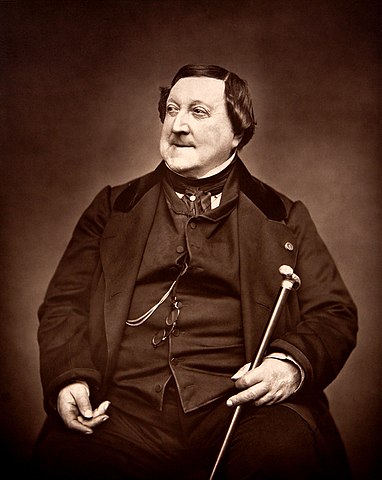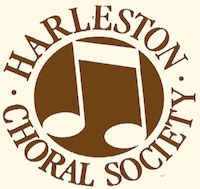Petite Messe Solennelle Gioachino Rossini (1792 – 1868)
1 Kyrie– Choir and soloists
2 Gloria– Choir and soloists
Gratias agimus tibi – Trio: alto, tenor, bass
Domine Deus – Tenor solo
Qui tollis peccata mundi – Duet: soprano, alto
Quoniam tu solus sanctus – Bass solo
Cum Sancto Spiritu – Choir and soloists
3 Credo– Choir and soloists
Crucifixus – Soprano solo
Et resurrexit – Choir and soloists
Et vitam venturi – Choir and soloists
4 Prélude religieux– Piano
5 Ritornelle– Harmonium
6 Sanctus– Choir and soloists
7 O salutaris hostia- Soprano solo
8 Agnus Dei– Alto soloist and choir
Although he composed in other genres, the Italian Gioachino Rossini (1792-1868) is most famous as a composer of both comic and serious operas and was prolific in that genre, composing almost 40 operas in a period of just over 20 years. His gift for writing inspired, song-like melodies permeates all his music and gave rise to his nickname ‘The Italian Mozart.’ Such was his facility and proficiency with composition and humorous repartee, that he apparently once quipped, “Give me the laundress’ bill and I will even set that to music.”
Life in the fast lane and the heavy workload eventually took its toll on the composer and, in 1829, aged only 27 and at the peak of his opera writing career, ill-health forced Rossini to retire from the opera stage. In 1855, after many years of debilitating illness, Rossini settled in Paris where he gradually became a leading musical figure at musical soirées in his own salon. From 1857 Rossini returned to composition, famously calling the compositions of this period the ‘sins of my old age.’ These chamber works, which included many pieces for choir and vocal ensemble, were performed by Rossini and the guests at his salon, but he never released any for publication during his lifetime.
Rossini spent the summer of 1864 composing his Petite messe solennelle. It is a chamber piece, originally scored for two pianos, harmonium and a dozen singers including the soloists. Well known for his sense of humour, at the end of the score Rossini adds the following message to God:
“Dear God, there you have it, finished this poor little mass. Is it really sacred music or is it cursed music that I have made? I was born for opera buffa (comic opera), as well you know! Little technique. A little heart, that’s all. So be Thou blessed and grant me Paradise.”
After successful performances in the chamber ensemble format, Rossini was persuaded by his friends, and favourable responses from critics, to orchestrate the piece for performance in a cathedral with larger scale forces. However, despite completing the orchestration, no large-scale performance ever happened in the composer’s lifetime. Rossini had an aversion to the sound of boys’ singing voices and wanted to have women sing instead, but Pope Pius IX was unwilling to provide the necessary papal dispensation required for that to happen.
Like so many of the works that he wrote in France towards the end of his life, Rossini forbade publication of the Petite messe. After his death, several versions appeared quickly across Europe, but none in the original orchestral scoring. The American scholar, Dr Nancy Fleming, prepared a performing edition of the work from the autograph manuscript for her doctoral dissertation and that version was taken up and published as an ‘urtext’ (original version) edition by Oxford University Press in 1991.
1 Kyrie
Kyrie eleison. Lord have mercy.
Christe eleison. Christ have mercy.
Kyrie eleison. Lord have mercy.
The movement opens with a quiet eight-bar introduction from the pianos and harmonium which gradually crescendos to the first choral entry Kyrie eleison, at which point the harmonium part supports the voices whilst the pianos have more rhythmic, almost percussive writing. The next section, Christe eleison, contrasts with the opening. It is set a cappella(unaccompanied) in the minor key and is redolent of the sacred polyphony of sixteenth century composers like Palestrina. At the return of the Kyrie eleisontext, the music is much as at the opening, with the very quiet ending gradually dying away.
2 Gloria
Rossini sets this part of the mass as six interconnected, but contrasting movements:
Gloria in excelsis Deo – Laudamus
Gratias agimus Tibi
Domine Deus
Qui tollis peccata mundi
Quoniam Tu solus sanctus
Cum Sancto Spiritu
Gloria in excelsis Deo (Glory be to God on high) is very loud – with the choir and instruments creating an immediate impression of energy and celebration after the Kyrie. Rossini sets the next part of the words from the Ordinary of the mass ‘Et in terra pax hominibus bonae voluntatis’ for the soloists, leaving the closing ‘Adoramus Te, Glorificamus Te’ to the choir.
Et in terra pax hominibus And on earth peace
Bonae voluntatis. Good will towards men.
Laudamus Te We praise Thee
Benedicimus Te We bless Thee
Adoramus Te We worship Thee
Glorificamus Te. We glorify Thee.
The next section,Gratias agimus Tibi, is set as a trio for alto, tenor and bass soloists with a single piano accompaniment.
Gratias agimus Tibi We give Thee thanks
Propter magnam gloriam Tuam. For Thy great glory.
Domine Deusis a substantial solo for tenor and piano.
Domine Deus, Rex coelestis, Lord God, Heavenly King,
Deus Pater omnipotens. God the Father Almighty.
Domine Fili unigenite O Lord the only begotten Son
Domine Deus, Agnus Dei. O Lord God, Lamb of God.
Filius Patris. Son of the Father.
Qui tollis peccata mundiis set as a duet for soprano and alto. The combination of close harmonies – mostly in thirds – and poignant imitation between the parts both underline the text. The focus on the vocal writing is achieved by laying it over an almost formulaic accompaniment; the harmonium mostly has sustained chords that support the vocal lines while the piano has an undulating semiquaver arpeggio figure. Rossini’s understanding of the affective potential of word setting is used to optimal effect in the ‘miserere nobis’ phrases.
Qui tollis peccata mundi, Thou that takest away the sins of the world
Suscipe deprecationem nostram. Hear our prayer.
Qui sedes ad dexteram Patris, Thou that sittest at the right hand of the Father,
Miserere nobis. Have mercy upon us.
At the start of the next movement, Quoniam Tu solus sanctus, Rossini provides a complete contrast, using a fast and transparent texture in the piano introduction that allows sufficient time for listeners’ ears to adjust before the bass solo starts. Interestingly, that introduction has more than a hint of the opera house about it – suggesting, perhaps, that Rossini felt that there had been enough dwelling on the pious nature of the text and that a change of direction was required.
Quoniam Tu solus sanctus, For Thou alone art holy,
Tu solus Dominus. Thou only art the Lord.
Tu solus Altissimus, Thou only art most high,
Jesu Christe. O Jesus Christ.
The final section, Cum Sancto Spiritu, reuses musical ideas from the Gloria in excelsis. This time, however, the setting is anything but brief with florid repeated ‘amen’ phrases that become ever longer. It is almost as if Rossini is testing the performers – to see how long a melisma (one syllable sung to several notes) could be before it was no longer possible to sing – and himself, to see how creative he could be setting a single word multiple times in the same movement. There is a false ending about two-thirds of the way through punctuated by two tremendously loud ‘amens’ before Rossini dovetails back to the opening of the movement and a last romp through a coda to the final ‘amen’.
Cum Sancto Spiritu With the Holy Ghost
In Gloria Dei Patris. In the glory of God the Father.
Amen. Amen.
3 Credo
Rossini sets this part of the mass as four interconnected contrasting movements:
Credo in unum Deum
Crucifixus
Et resurrexit
Et vitam venturi
Credo in unum Deumis set as a series of alternating passages for choir and soloists. These contrasts make the considerable amount of text more intelligible for the listener and provide opportunities for the inventive Rossini to highlight certain phrases through inspired musical means. He uses a musical phrase that descends with the words ‘nostram salutem descendit de coelis’ which is followed by the soloists singing very quietly, ‘Et incarnatus est de Spiritu Sancto ex Maria Virgine’ which is punctuated first by the upper and then by the lower voices bringing us back to the temporal world ‘Et homo factus est.’ A short piano coda draws the movement to a close.
Credo in unum Deum, I believe in one God,
Patrem omnipotentem, the Father Almighty,
Factorem cœli et terrae, Maker of heaven and earth,
visibilium omnium et invisibilium. of all things visible and invisible.
Et in unum Dominum, Jesum Christum, And in one Lord, Jesus Christ,
Filium Dei unigenitum, the only-begotten Son of God,
et ex Patre natum ante omnia saecula. born of the Father before all ages.
Deum de Deo, Lumen de Lumine, God from God, Light from Light,
Deum verum de Deo vero, true God from true God,
genitum non factum, begotten, not made,
consubstantialem Patri, consubstantial with the Father,
per quem omnia facta sunt. by Whom all things were made.
Qui propter nos homines et propter Who for us men and for our salvation
nostram salutem descendit de coelis. came down from Heaven.
Et incarnatus est de Spiritu Sancto And was incarnate by the Holy Ghost
ex Maria Virgine, et homo factus est. out of the Virgin Mary, and was made man.
The opening of the Crucifixusis marked pianissisimo (very, very, quiet). The lilting piano accompaniment is supplemented with sustained chords on the harmonium that support the solo soprano line. Where the Credois expansive and emphatic, this movement is reflective and intimate.
Crucifixus etiam pro nobis, He was also crucified for us,
Sub Pontio Pilato passus, Suffered under Pontius Pilate,
et sepultus est. And was buried.
From its startling a cappella ‘et resurrexit’ declamation from the sopranos, the Et resurrexit movementis anything but subtle, with emphatic and loud choral ‘Credo’ (I believe) interjections punctuating the texture at strategic points. The contrasting pianissimo choral ‘et ascendit in coelum’ is taken up by the four soloists.
Et resurrexit tertia die, And on the third day rose again,
secundum Scripturas, according to the Scripture,
et ascendit in coelum, And ascended into Heaven,
sedet ad dexteram Patris. and sits on the right hand of the Father.
The choir takes on the rest of the life-affirming musical passage that states the tenets of Christian beliefs.
Et iterum venturus est cum gloria, And He shall come again, with glory,
judicare vivos et mortuos, to judge the living and the dead,
cujus regni non erit finis; Of His Kingdom there shall be no end;
Et in Spiritum Sanctum, And I believe in the Holy Spirit,
Dominum et vivificantem, the Lord, and Giver of Life,
qui ex Patre Filioque procedit. Who proceeds from the Father and the Son
Qui cum Patre et Filio Who, with the Father and the Son,
simul adoratur et conglorificatur: is together adored and glorified,
qui locutus est per prophetas. Who has spoken through the Prophets.
The soloists’ quiet affirmation, ‘Et unam sanctam, Catholicam et Apostolicam Ecclesiam’ is immediately broken by the choir’s loud ‘Credo’ before they continue on their statement of the Creed.
Et unam, sanctam, catholicam And I believe in One, Holy, Catholic
et apostolicam Ecclesiam. and Apostolic Church.
Confiteor unum baptisma I confess one Baptism
in remissionem peccatorum. for the remission of sins.
Et expectoAnd I await
resurrectionem mortuorum. the Resurrection of the Dead.
The final section of the Credo, Et vitam venturi is reminiscent of the Cum sanctoin the Gloria, with its fugal beginning and the many musical variants on the word ‘Amen.’
Et vitam venturi saeculi. And the Life of the world to come.
Amen.Amen.
4 Prélude religieux
French masses in the mid-19thcentury frequently included additional movements that were not part of the Ordinary of the Mass, such as an instrumental Offertoiremovement. The Prélude religieuxappears to have been lifted wholesale from a pre-existing ‘sins of old age’ collection and just inserted into the mass. As to whether the piano or the harmonium is intended to play the Prélude, the autograph score is ambiguous, and the question is academic asit works with either instrument. This evening we have chosen to use the piano.
5 Ritornelle
Rossini may have created the preceding movement as an opportunity to give his singers a break in the performance, but he then had to write a musical ‘fix’ to enable the singers to be able to pitch the opening a cappella passage at the start of the Sanctus. The short, somewhat quirky Ritornelle in C for the harmonium performs that function perfectly and adds to the unique charm of the entire piece.
6 Sanctus & Benedictus
Sanctus, sanctus, sanctus, Holy, holy, holy,
Dominus Deus Sabaoth. Lord God of hosts.
Pleni sunt coeli et terra gloria tua. Heaven and earth are full of Thy glory.
Hosanna in excelsis. Hosanna in the highest.
Benedictus qui venit in nomine Domine. Blessed is he that cometh in the name of the Lord.
Hosanna in excelsis. Hosanna in the highest.
The entire movement is intended to be sung a cappella, that is, without any accompaniment. In the opening phrase the word sanctusis repeated. It is louder each time before the soloists dovetail their phrase. The alternation of choral and solo passages is a feature of this movement.
7 O salutaris hostia
French masses in the mid-19thcentury frequently included an additional motet movement, such as O salutaris hostia,or Domine salvum fac. Rossini honours that tradition by including a version of the former that had been composed for solo soprano and piano before he started writing the Petite messesolennelle.
O salutaris hostia! O saving Victim!
Quae coeli pandis ostium, Opening wide the gate of Heaven to man below,
Bella premunt hostilia. Our foes are pressed hard on every side.
Da robur, fer auxilium. Thine aid supply, Thy strength bestow.
8 Agnus Dei
Agnus Dei qui tollis peccata mundi: Lamb of God, who takest away the sins of the world:
Miserere nobis. Have mercy upon us.
Agnus Dei qui tollis peccata mundi: Lamb of God, who takest away the sins of the world:
Dona nobis pacem. Give us peace.
The final movement opens with a dramatic seven-bar piano introduction which has some stark contrasts of dynamics and conspicuous use of rests. The accompaniment to the alto solo starts at the eighth bar, with an ostinato-like figure (persistently repeated) on the piano and sustained chords from the harmonium on the half bar.
The alto solo, Lamb of God, who takest away the sins of the world: have mercy upon us, which complements the rhythmic intensity of the piano accompaniment, is punctuated by ‘sotto voce’ pleading from the choir, Give us peace. This pattern is repeated and, on the third time through, the choir joins the alto in a coda section based on the words who takest away the sins of the world, which appears to be drawing to a quiet close. Rossini, however, has others ideas and the erstwhile ‘sotto voce’ Give us peace phrase from the choir becomes a dogmatic fortissimo, which could be the proper ending. Yet again Rossini diverges from what he has established; he does not end the work with this final loud flourish and returns instead to the instrumental opening eight bars of the Agnus Deiplayed very quietly, as it was at the start of the movement.


